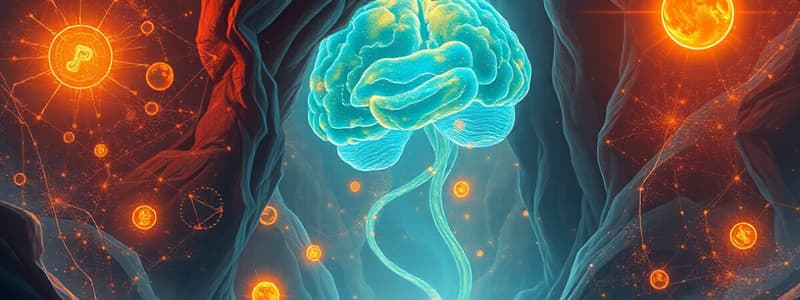Podcast
Questions and Answers
Que son os procesos cognitivos e cal é a súa función principal?
Que son os procesos cognitivos e cal é a súa función principal?
Os procesos cognitivos son operacións mentais que realiza o cerebro para procesar información vinda dos sentidos e a súa función principal é adaptarse ao medio e tomar decisións.
Como influenzan os procesos cognitivos no éxito persoal?
Como influenzan os procesos cognitivos no éxito persoal?
Os procesos cognitivos son clave para a aprendizaxe, a toma de decisións e a adaptación social, factores que contribúen ao éxito persoal.
Cales son os factores que afectan á motivación no proceso de aprendizaxe?
Cales son os factores que afectan á motivación no proceso de aprendizaxe?
A motivación está influenciada por recompensas, expectativas, planos e atraccións que podemos ter ou desexamos alcanzar.
Que tipos de memoria existen e cal é a súa importancia?
Que tipos de memoria existen e cal é a súa importancia?
Que ocorre coas funcións cognitivas en casos de deterioro como a enfermidade de Alzheimer?
Que ocorre coas funcións cognitivas en casos de deterioro como a enfermidade de Alzheimer?
Por que é importante a atención na percepción da información?
Por que é importante a atención na percepción da información?
Como pode a parálise cerebral infantil afectar aos procesos cognitivos?
Como pode a parálise cerebral infantil afectar aos procesos cognitivos?
De que maneira a interpretación dos estímulos a través da percepción afecta á conducta?
De que maneira a interpretación dos estímulos a través da percepción afecta á conducta?
Os procesos cognitivos só son importantes para a percepción sensorial.
Os procesos cognitivos só son importantes para a percepción sensorial.
A motivación é un proceso que impulsa a aprendizaxe.
A motivación é un proceso que impulsa a aprendizaxe.
A memoria de traballo é un tipo de memoria que se ten en conta nos procesos cognitivos.
A memoria de traballo é un tipo de memoria que se ten en conta nos procesos cognitivos.
Os procesos cognitivos non se poden deteriorar en ningún caso.
Os procesos cognitivos non se poden deteriorar en ningún caso.
A falta de atención pode afectar a capacidade de procesar información.
A falta de atención pode afectar a capacidade de procesar información.
A enfermidade de Alzheimer non ten efecto nos procesos cognitivos.
A enfermidade de Alzheimer non ten efecto nos procesos cognitivos.
Os procesos cognitivos son irrelevantes para a supervivencia do individuo.
Os procesos cognitivos son irrelevantes para a supervivencia do individuo.
A percepción e a atención son procesos que funcionan de forma separada e independente.
A percepción e a atención son procesos que funcionan de forma separada e independente.
Os procesos cognitivos son claves para a adaptación ao medio social.
Os procesos cognitivos son claves para a adaptación ao medio social.
A parálise cerebral infantil non ten ningún efecto sobre os procesos cognitivos.
A parálise cerebral infantil non ten ningún efecto sobre os procesos cognitivos.
A motivación está influenciada por expectativas e recompensas.
A motivación está influenciada por expectativas e recompensas.
Todos os individuos utilizan os procesos cognitivos na mesma medida.
Todos os individuos utilizan os procesos cognitivos na mesma medida.
A memoria a curto prazo é un dos tipos de memoria que existen.
A memoria a curto prazo é un dos tipos de memoria que existen.
Os procesos cognitivos non están relacionados coa toma de decisións.
Os procesos cognitivos non están relacionados coa toma de decisións.
A enfermidade de Alzheimer pode deteriorar os procesos cognitivos.
A enfermidade de Alzheimer pode deteriorar os procesos cognitivos.
A percepción e a atención son procesos que non interactúan entre si.
A percepción e a atención son procesos que non interactúan entre si.
Cal é a principal necesidade psicolóxica dos adolescentes durante a súa transición a adulthood?
Cal é a principal necesidade psicolóxica dos adolescentes durante a súa transición a adulthood?
Os adolescentes buscan a súa identidade persoal independentemente das influencias externas.
Os adolescentes buscan a súa identidade persoal independentemente das influencias externas.
Que carácterísticas ten un adolescente cunha boa autonomía persoal?
Que carácterísticas ten un adolescente cunha boa autonomía persoal?
A autoafirmación e a __________ son procesos clave na adolescencia para acadar autonomía.
A autoafirmación e a __________ son procesos clave na adolescencia para acadar autonomía.
Relaciona cada aspecto dos adolescentes coa súa correspondente descrición:
Relaciona cada aspecto dos adolescentes coa súa correspondente descrición:
Study Notes
Cognitive Processes
- Cognitive processes are the mental operations our brain performs to process information received from the senses.
- These operations gather information from the environment, store it, and analyze it to make decisions.
- Cognitive processes are essential for learning and adapting to the environment.
- They are crucial for survival, social adaptation, forming relationships, finding work, and pursuing projects, ultimately contributing to success.
- Cognitive processes can be impaired, either through conditions like cerebral palsy or deterioration caused by diseases, head injuries, or intoxications.
- Alzheimer's disease is a debilitating condition that demonstrates the consequences of cognitive deterioration.
Processes Involved in Learning
- Perception and Attention: Our senses collect information from the environment, and we focus on the stimuli we are interested in through attention, filtering out irrelevant information.
- Motivation: Impelled by rewards, plans, expectations, and attributions, motivation drives us to learn.
- Memory: Information is stored in our brain and retrieved when needed. Different types of memory exist, including sensory, short-term, long-term, working, semantic, and autobiographical memory.
Cognitive Processes
- Cognitive processes are mental operations our brains use to process information received through our senses.
- These processes allow our brains to gather information, store it, analyze it, and make decisions.
- Cognitive processes are vital for adaptation, social interaction, and success.
Cognitive Processes and Learning
- Cognitive processes are essential for learning and adaptation.
- They help us adapt to the environment, build relationships, succeed at work, and develop projects.
Processes Involved in Learning
- Perception and Attention: Our senses capture information from the environment, and attention helps us focus on the stimuli that interest us, discarding the rest.
- Motivation: Drives our desire to learn, influenced by rewards, plans, expectations, and perceived outcomes.
- Memory: Stores information in our brains for later retrieval. Different types of memory exist, including sensory, long-term, short-term, working, semantic, and autobiographical memory.
Impact on Cognitive Processes
- Cognitive processes can be negatively impacted by disorders like cerebral palsy, or deteriorate due to illnesses, head injuries, or intoxications.
- Alzheimer's disease is a prominent example of cognitive decline, showcasing the impact of deteriorating cognitive processes.
Cognitive Processes
- Cognitive processes are mental operations conducted by the brain to process information received through sensory perception.
- These processes enable the brain to gather, store, and analyze information from the environment, guiding decision-making.
- Cognitive processes are essential for adaptation, interaction with the environment, and success in life.
- Deteriorated cognitive processes can be caused by conditions like cerebral palsy or illnesses such as Alzheimer's disease, head injuries, or poisoning.
Processes Involved in Learning
- Perception and attention: Senses gather information, while attention focuses on relevant stimuli and filters irrelevant ones.
- Motivation: This internal drive fuels learning by engaging goals, rewards, expectations, and potential outcomes.
- Memory: The brain stores information and retrieves it when needed. Different memory types exist, including sensory memory, short-term and long-term memory, working memory, semantic memory, and autobiographical memory, among others.
Adolescence and Autonomy
- Adolescence is a crucial period for individuals, as they transition from childhood to adulthood, experiencing physical, hormonal, cognitive and emotional changes.
- Adolescents develop the foundations for their adult selves as they gain more autonomy.
- A key aspect of adolescence is the psychological need for independence, often conflicting with the dependence imposed by family and society.
- The desire to separate from parents is driven by the search for personal identity, a unique and distinct self.
- This process involves self-affirmation, often leading to internal struggles and contradictions as adolescents strive for autonomy.
- Achieving personal autonomy involves developing the capacity to distinguish between right and wrong, establishing a personal value system, and taking responsibility for daily decisions.
- While financial independence often accompanies this process, it is not intrinsically linked to leaving the family home and is more about personal maturity.
- Unlike children, who are primarily motivated by rewards, punishments, or direct instructions, adolescents become more responsible for their actions.
- Adolescents who possess autonomy demonstrate self-confidence, make responsible decisions, take initiative, are adaptable, accept setbacks, and strive to improve.
Studying That Suits You
Use AI to generate personalized quizzes and flashcards to suit your learning preferences.
Description
Este cuestionario explora os procesos cognitivos que realizan as operacións mentais no tratamento da información que recibimos. A través da percepción, atención e motivación, estes procesos son fundamentais para o aprendizaxe e a adaptación ao ambiente. Tamén se abordan as implicacións das deterioracións cognitivas, como a enfermidade de Alzheimer.




